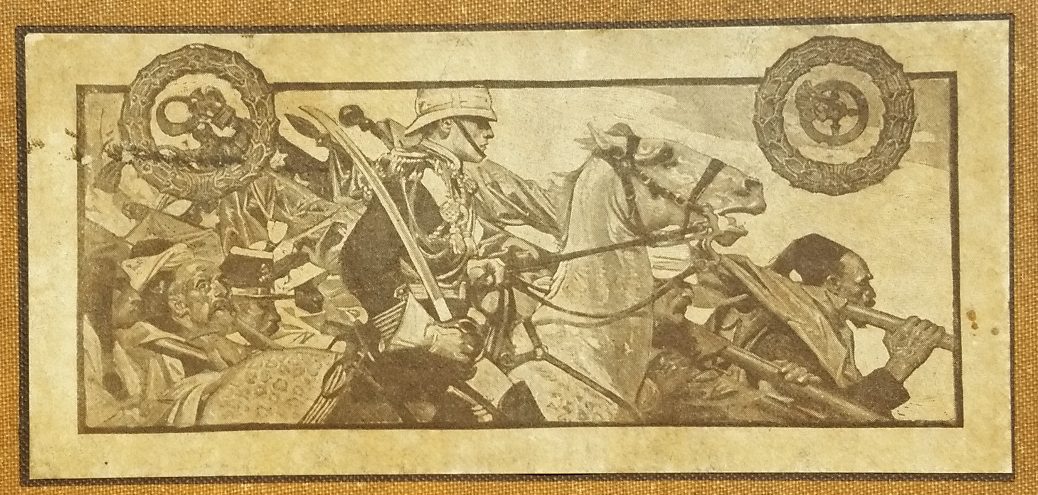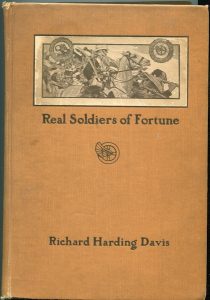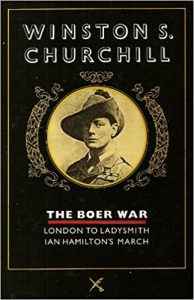
Lt. Churchill: “A Subaltern’s Advice to Generals”
With colleagues I discussed which of young Winston’s early war books was derisively called, “A Subaltern’s Advice to Generals.” This was a popular wisecrack after his early works had the temerity to propose British military strategy in India, Sudan and South Africa. Churchill was in his mid-twenties at the time—but not reticent to speak his mind. Nothing we didn’t know here….
Malakand Field Force?
Without consulting references, I thought the “advice” line involved The Story of the Malakand Field Force (Churchill’s first book, 1898). I was influenced by its last chapter, “The Riddle of the Frontier.” Plenty of advice there, though it is as much political as it is military.
I also remember the fine biopic Young Winston (1972). Here General Kitchener picks up a copy of what looks like a first edition Malakand, scans its cover, and hurls it into a wastebasket!
Churchill was at the time lobbying for appointment as a war correspondent on Kitchener’s expedition to recapture Sudan. Dalton Newfield, the second editor of Finest Hour, wrote in his column, “75 Years Ago” FH #28 (1973):
[Churchill] gathered his forces for a tremendous effort to join Kitchener’s forces In Egypt, after which he would return to England and politics. He unashamedly pulled every string known to him or [his mother] Lady Randolph, but Kitchener remained obdurate. He had read the Malakand, often referred to in military circles as “A Subaltern’s Advice to Generals.” He wanted no part of the brash young lieutenant.
Surprisingly, there are few appearances of “A Subaltern’s Advice to Generals” in the Churchill canon. Ted Morgan, in Churchill: The Rise to Failure, alludes to it in passing:
Kitchener listened in absolute silence as Winston told him that the enemy was advancing in large numbers between the British position and the city of Omdurman. “You say the Dervish [Sufi Muslim] army is advancing,” Kitchener said. “How long do you think I have got?” The commander-in-chief was asking a subaltern’s advice, which Winston did not hesitate to give. “You have got at least an hour—probably an hour and a half, sir, even if they come on at their present rate.”
The River War?
But that reference proves nothing, really. Churchill historian Paul Courtenay thought “A Subaltern’s Advice to Generals” refers to Churchill’s second book, The River War.
 Mr. Courtenay based his answer on Richard Harding Davis’s Real Soldiers of Fortune (London: P.F. Collier & Sons, 1906), 108. Admittedly his Churchill chapter contains several inaccuracies, but this reference to River War looked right:
Mr. Courtenay based his answer on Richard Harding Davis’s Real Soldiers of Fortune (London: P.F. Collier & Sons, 1906), 108. Admittedly his Churchill chapter contains several inaccuracies, but this reference to River War looked right:
Equally disgusted [with The River War] were the younger officers of the service. They nicknamed his book, “A Subaltern’s Advice to Generals,” and called Churchill himself a “Medal Snatcher”…. But Churchill never was a medal hunter. The routine of barrack life irked him…. Indeed the War Office could cover with medals the man who wrote the Malakand and River War and still be in his debt.
I appealed for adjudication to a judge, the Hon. Douglas Russell, who is not only a judge but the author of a distinguished book, Winston Churchill Soldier: The Military Life of a Gentleman at War. Judge Russell replied in detail (reprinted by kind permission)…
Douglas Russell:
If we conclude that the “subaltern’s advice” quip was the reason Kitchener did not want Churchill in the Sudan, the book has to be the Malakand. It could not be The River War, which was published after Churchill left the Sudan campaign. By that time, young Winston was trying to get into the Second Boer War, and the general making the decision was Roberts, not Kitchener.
 It is not clear that Churchill’s critiques in the Malakand caused Kitchener’s resistance to him joining the Sudan campaign. I have never verified that. I do not know if Kitchener even read the book. It is clear that Kitchener did not like journalists generally. He certainly knew of Churchill. In August 1898 Winston wrote to his mother:
It is not clear that Churchill’s critiques in the Malakand caused Kitchener’s resistance to him joining the Sudan campaign. I have never verified that. I do not know if Kitchener even read the book. It is clear that Kitchener did not like journalists generally. He certainly knew of Churchill. In August 1898 Winston wrote to his mother:
F[rancis Rhodes, correspondent for The Times] v[er]y kind and amiable. He talked to Sirdar [leader] about me. Kitchener said he had known I was not going to stay in the army—was only making a convenience of it; that he had disapproved of my coming in place of others whose professions were at stake….
This may be the real reason Kitchener did not want Churchill. I do not give great weight to Richard Harding Davis and his Real Soldiers of Fortune. His Churchill chapter has several basic errors on other topics. I have looked at the 1914, 1941 and 1981 editions and there are no footnotes. Davis was a popular rather than a scholarly writer. The subaltern’s advice quip is the sort of thing that would appear in a soldier’s memoir, as something that he had heard someone else say without disclosing the individual who actually said it.
Subaltern’s Advice
So which book contained Lieutenant Churchill’s Advice to his Generals? We concluded that the best reference available is Davis (his errors elsewhere notwithstanding). A war correspondent himself, Davis associated with military types. The wisecrack could have been going around, and if he heard it about The River War, so be it. Churchill in that book deplored certain of Kitchener’s actions after the victory at Omdurman, such as destroying the Mahdi’s tomb.
Still, one could use this humorous subtitle for any of his four war books, all published before he had turned twenty-six. Forever fascinated by war strategy, Churchill never hesitated to speak his mind, whether he was twenty-five or seventy.







One thought on “Lt. Churchill: “A Subaltern’s Advice to Generals””
A legend so well-known it almost certainly originated as a joke cracked in some officer’s mess, I think you are right about Davis even though he was foggy on a few details.
Comments are closed.